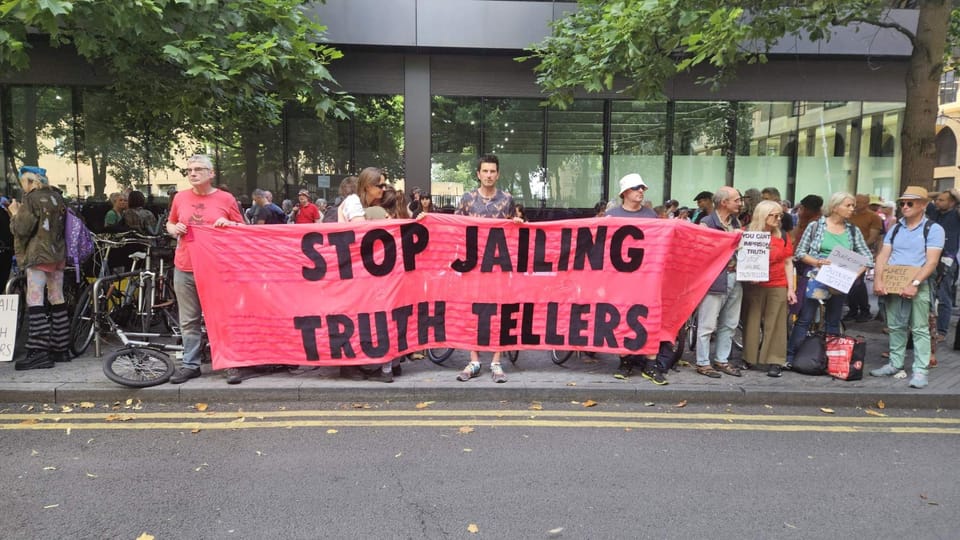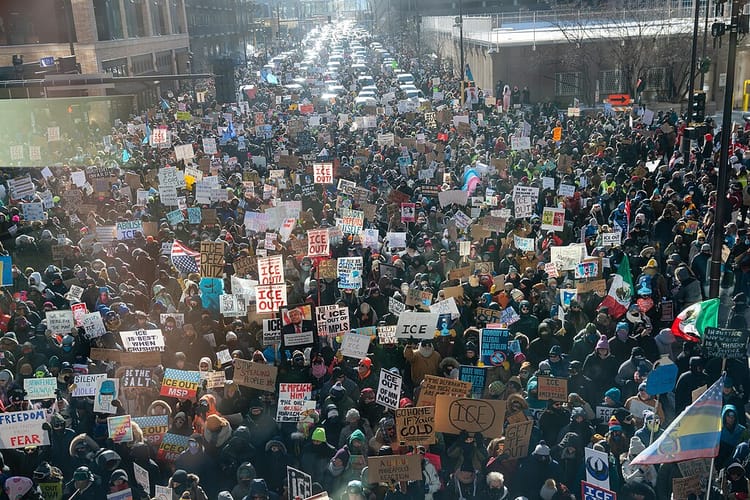De-fund the Tone Police

When the stakes are high—a U.S. descent into fascism, genocide in Gaza, the specter of World War III, extreme storms and fires, and a tight window closing on our ability to avoid more and worse of them—people do not always bring their best selves to the fight. This is particularly true of people who have grown accustomed to not having to fight for much and, perhaps more to the point, to not having to fear.
The timeline of climate in particular has a lot of people feeling like we don't have time to get it wrong, which, in the minds and mouths of those with power and privilege—many of whom have been dictating terms for the duration of the climate crisis—often turns into "we don't have time to listen to your ideas or try your way, I am the one with the answers, follow me."
Against this backdrop of existential dread and timelines and jockeying to...not really lead so much as dominate...I've been seeing various spats in climate spaces about how we should or shouldn't talk about this or that. I'm gonna focus on two of them today—the response to climate protest, and the discussion around how Kamala Harris is talking about climate—because it all has me, once again, very worried about how small the climate movement has become, how homogeneous its leadership, and how much it is coalescing around the ideas that have dominated it for decades and...sorry to break it to you, have not worked.
On Protest and "Civility"
Over the past two years, there's been a sudden and severe backlash to climate protest, both legally and socially. I have to say, the social bit surprised me. Not that people on the street might start to get annoyed with protestors and harass them, as they have been, but that so many in the climate movement itself would turn on protestors in lock step with the state. It's been shocking in recent weeks, for example, to see so many climate advocates so callously shrug off the extreme sentences received by Just Stop Oil protestors in the U.K. as something expected and, worse, deserved. We've of course been covering the increased criminalization of climate protest at Drilled for going on two years now, but let me re-state for the record: none of the art protests have caused any actual damage. We're talking about soup and water-based finger paint being smeared on or thrown at glass, which requires about $15 and 20 minutes to clean. The protests are shocking, yes, they make people think a priceless work of art is at risk, yes, and that is the point: everything is at risk, shouldn't we be shocked? But these protests are not causing damage. Nor are they particularly radical in the context of social movements and civil disobedience (follow and read Dana Fisher for more, including her excellent book Saving Ourselves). So why are they making climate people so mad?
Last week, the group Climate Defiance interrupted an event held by the Breakthrough Institute to yell at pundit Matt Yglesias over his support of fracking. Now...was this strategically brilliant? I am neither a strategist nor an organizer, so it's genuinely unimportant what I think, but I will say it certainly seemed to give Yglesias what he is dying for: relevance, attention, and an excuse to criticize the youth climate movement. What it was not was as BTI leader Ted Nordhaus tweeted and then wrote on their blog: incitement to political violence. (Fun fact: this is an accusation the BTI bois throw around a lot. Years ago one of them accused yours truly of trying to incite "violent revolution" by suggesting that certain things probably wouldn't change until people took to the streets and demanded change.)
Perhaps when one is so used to comfort, having a conference panel interrupted for a few minutes feels like violence. What's more concerning is how much that rather dramatic view seems to echo a mainstream opinion of the climate movement: that protest ought to be civil if it hopes to be effective. Which can't help but make me think of everything I know about Arthur Brooks who—before his current iteration as half TikTok life coach, half Harvard professor—ran the American Enterprise Institute for years and talked about calls to civility as a way to paint social justice demands as radical. Or of the many ways that calls for civility have always been used as a cudgel against those who confront racism.
It's interesting to see Nordhaus in particular clutching his pearls; for years one of his talking points has been that if the climate movement were really concerned about climate change, it would be embracing technology more (particularly nuclear). Apparently the correct expression of concern is to protest in favor of nuclear power, not to protest against anything.
Amidst all the twitter spats and blog posts arguing whether this or that type of protest "turns people off," whether it "works," whether it's "cringe" is a very big problem that is going largely ignored: Kids are being locked up for years for non-damaging, non-violent protest. People are being accused of "conspiring against the United States" for smearing fingerpaint on glass, as Joanna Oltman Smith and Tim Martin were. In Germany, the youth activists Last Generation had their homes raided, computers seized, and bank accounts frozen for organizing protests that...sometimes cause traffic jams. That should scare anyone who doesn't love fascism, whether they think the protests are rude or not. It should certainly concern those who feel as panicked as the climate activists do about the climate crisis that the tools of the state are being used to silence and jail those willing to act in a way that reflects that panic.
You Have to Say Climate Or It Doesn't Count
At the other end of the political spectrum, I've also seen a lot of people criticizing Kamala Harris for talking about clean air and clean water—or sometimes oil companies' price gouging—instead of saying the words "climate change" or "climate crisis". And before I say anything else, no, this is not an endorsement. I am a journalist, I have never endorsed any candidate, and I never will. Do I love that she's talking about inviting Republicans to advise her on policy? That she seems to fetishize compromise as a political end almost as much as her predecessor? No. But I have to say, I think whoever is advising her about how to talk about climate specifically is not an idiot.
Talking about clean air and water is a throwback to the 1970s, it's true. It's also accessible to the widest possible spectrum of voters, without any of the "culture war" coding that climate has. And because I follow a bunch of random right-wing operatives, I know it's also the thing that the fossil fuel industry has been afraid Democrats will do for the past 20 years. Steve Milloy, a longtime climate denier who was on the Trump EPA transition team and who boasts about having coined the insult "watermelon" to describe climate activists (green on the outside, red in the middle, get it?) has been warning the Heartland Institute, the Heritage Foundation and so forth for years that if climate advocates ever get their talking points together on air pollution the fossil fuel industry is done for. Why? Because it's easier to get people to understand that they're being poisoned in the here and now than it is to explain to them that the world is slowly becoming less habitable and that we need to take bold action now to avert that crisis. And because the biggest contributor to deadly air pollution happens to be the biggest driver of climate change: fossil fuel combustion (plus burning wood).
As far as pointing out that oil companies are the ones responsible for high costs at home and at the pump? That message is absolutely necessary because the American Petroleum Institute has been making the rounds of every cable news show for the past four years saying climate policy is driving up gas prices (not true, but most TV news anchors don't know enough about how gas prices work to push back; it helps to have a presidential candidate explaining it over and over again). The FTC just accused the second fossil fuel CEO, John Hess, CEO of Hess Corporation, of conspiring with OPEC to keep prices high. Any politician that wants to see an energy transition in their lifetime should be shouting about that from the rooftops.
The unfortunate reality is that climate change has been painted with the "elite liberal" brush since long before it got pulled into recent culture war conversations. If talking around it helps break through some of those barriers, that seems not only harmless, but actually good. People get too hung up sometimes on hearing their preferred message, on people "believing science," but if a different route gets us to the same destination—maybe even faster—is there really any harm in using language or ideas that are more accessible to more people? I haven't seen a convincing argument yet about why the climate crisis must be named as such (although if you have, or you want to send me yours, please do! As always, I am very open to being wrong.)
The climate movement has been led by people who look and think and talk the same for a very long time. If time is short, isn't this precisely the time to try everything? To broaden out, seek fresh ideas, build a larger, stronger and more connected movement?
Climate Must-reads
- [Op-Ed] "What Are Hurricane Conspiracy Theories and Why Are They Spreading?" by Mary Annaïse Heglar for Teen Vogue. An excellent essay from Mary on the need for empathy, not mockery, in response to the Hurricane Helene conspiracies.
- "Big Oil Urges Trump Not to Gut Biden’s Climate Law," by Collin Eaton and Benoît Morenne for The Wall Street Journal. Surprise! The fossil fuel industry likes all the carve-outs it got in the IRA.
- "Politicize Hurricane Milton, Please," by Kate Aronoff for The New Republic. An excellent analysis of the shortcomings of a U.S. climate approach that focuses solely on industrial policy.
- "The Shady Origins of the Climate Haven Myth," by Adam Clark Estes for Vox. An excellent piece dispelling the idea that any of us are truly safe from storms like Helene or the climate crisis writ large.
- "Fossil fuel interests are working to kill solar in one Ohio county. The hometown newspaper is helping." by Miranda Green, Jennifer Smith Richards, and Priyanjana Bengani for Floodlight, ProPublica, and the Tow Center for Digital Journalism. Terrific reporting on a retired gas industry executive, a shadowy 'grassroots' group and a controversial media company working to spread misinformation about solar in Ohio while turning residents against a proposed solar farm — and each other.





